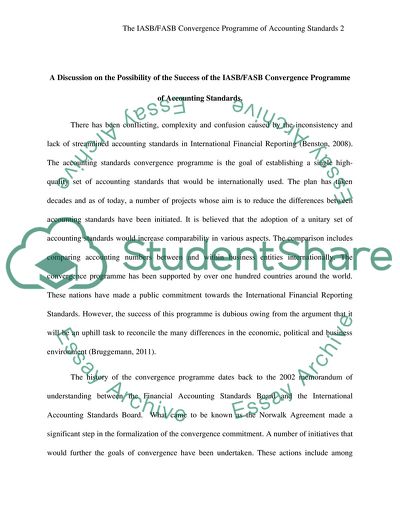Cite this document
(The IASB/FASB Convergence Programme of accounting standards will never Essay, n.d.)
The IASB/FASB Convergence Programme of accounting standards will never Essay. https://studentshare.org/finance-accounting/1867265-the-iasbfasb-convergence-programme-of-accounting-standards-will-never-be-successful-because-it-will-be-unable-to-reconcile-significant-differences-in-the-business-economic-and-political-environment-required-discuss-with-the-aid-of-relevant-examples
The IASB/FASB Convergence Programme of accounting standards will never Essay. https://studentshare.org/finance-accounting/1867265-the-iasbfasb-convergence-programme-of-accounting-standards-will-never-be-successful-because-it-will-be-unable-to-reconcile-significant-differences-in-the-business-economic-and-political-environment-required-discuss-with-the-aid-of-relevant-examples
(The IASB/FASB Convergence Programme of Accounting Standards Will Never Essay)
The IASB/FASB Convergence Programme of Accounting Standards Will Never Essay. https://studentshare.org/finance-accounting/1867265-the-iasbfasb-convergence-programme-of-accounting-standards-will-never-be-successful-because-it-will-be-unable-to-reconcile-significant-differences-in-the-business-economic-and-political-environment-required-discuss-with-the-aid-of-relevant-examples.
The IASB/FASB Convergence Programme of Accounting Standards Will Never Essay. https://studentshare.org/finance-accounting/1867265-the-iasbfasb-convergence-programme-of-accounting-standards-will-never-be-successful-because-it-will-be-unable-to-reconcile-significant-differences-in-the-business-economic-and-political-environment-required-discuss-with-the-aid-of-relevant-examples.
“The IASB/FASB Convergence Programme of Accounting Standards Will Never Essay”. https://studentshare.org/finance-accounting/1867265-the-iasbfasb-convergence-programme-of-accounting-standards-will-never-be-successful-because-it-will-be-unable-to-reconcile-significant-differences-in-the-business-economic-and-political-environment-required-discuss-with-the-aid-of-relevant-examples.


